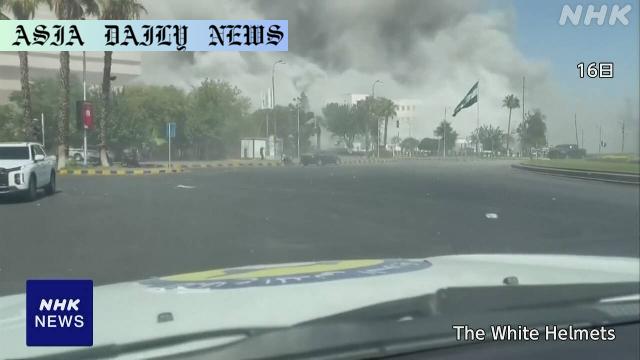Israel airstrikes – Syria condemns attacks on Damascus, with 3 deaths and 34 injuries reported, escalating regional tension.

Syria Strongly Condemns Israeli Airstrikes
Syria has issued a forceful condemnation of recent Israeli airstrikes that targeted military headquarters and other sites in Damascus, resulting in 3 fatalities and 34 injuries. The strikes occurred on Wednesday, escalating tensions in a region already plagued by instability. In response, interim President Ahmed al-Sharaa vehemently denounced the strikes during his televised address on Thursday, characterizing them as an effort by Israel to transform Syria’s “pure land into an arena of endless chaos.” Such sentiments echo the ongoing discord that has troubled Syria for over a decade.
Israel Justifies Its Actions as Defensive
The Israeli government, however, has provided its rationale for carrying out these attacks. Israel Defense Forces Chief of the General Staff Eyal Zamir emphasized that the strikes were conducted to protect the Druze minority in southern Syria. According to Israel’s stance, this minority has faced potential threats from hostile elements attempting to establish strategic influence near the border, a development that Israel sees as unacceptable.
Tensions Rise in Sweida
The strikes came in the context of escalating violence in Sweida, a southern Syrian province. Activists report that clashes erupted earlier this month between local Druze communities and Bedouin tribes over territorial disputes and security concerns. While the Syrian interim government attempted to intervene by deploying forces to calm the situation, these troops became targets of Israeli airstrikes, thereby exacerbating tensions in a highly volatile area.
A Fragile Peace and Ongoing Developments
In light of these developments, Syria’s state-run news agency reported a partial withdrawal of government forces in Sweida following an agreement between local religious leaders and Damascus authorities. However, the region remains far from stable. The Israeli military continues to monitor the dynamics in southern Syria closely, signaling preparedness for potential scenarios that could require further action. As these events unfold, the global community watches with concern, urging restraint from all sides to prevent further ignition of conflict.
Syria’s Perspective and Call for Global Attention
From Syria’s perspective, the airstrikes are subject to sharp criticism, not only for their immediate death toll but also for contributing to broader instability in an already fragile nation. Damascus argues that such attacks undermine the delicate fabric of local governance and international diplomacy. This incident amplifies the call for the international community to focus not only on addressing Syria’s internal strife but also on minimizing foreign interventions.
Commentary
The Human Cost of Conflict
The recent Israeli airstrikes on Damascus highlight once again the tragic human toll of prolonged conflict and instability in the Middle East. With three lives lost and dozens injured, families and communities now face the devastating aftermath of these violent escalations. For many Syrians, this is yet another episode in an ongoing struggle that has failed to yield peace or resolution. The narratives of those affected—both in the immediate and broader sense—must remain central to any discussion on policy or intervention in the region.
The Complexity of Regional Politics
Israel’s justification for the attacks, citing protection for minority Druze populations, adds a layer of complexity to the narrative. While such defensive measures are not unprecedented, they underscore a recurring theme in Middle Eastern geopolitics, where local groups often find themselves entangled in broader regional disputes. This raises important questions about sovereignty, the role of neighbors in cross-border security, and the boundaries of acceptable military action. Addressing these issues requires diplomacy that respects both local dynamics and international norms.
Urgent Need for Global Mediation
As tensions escalate, it becomes increasingly clear that the international community must play a more active role in mediating the conflict. Without neutral intervention, the risk of escalation increases significantly, potentially destabilizing not just Syria but surrounding nations as well. The need for humanitarian aid, conflict resolution strategies, and sustainable peace agreements has never been more urgent. Stakeholders must prioritize human lives over political gains to ensure that civilians are no longer the collateral damage of prolonged disputes.


